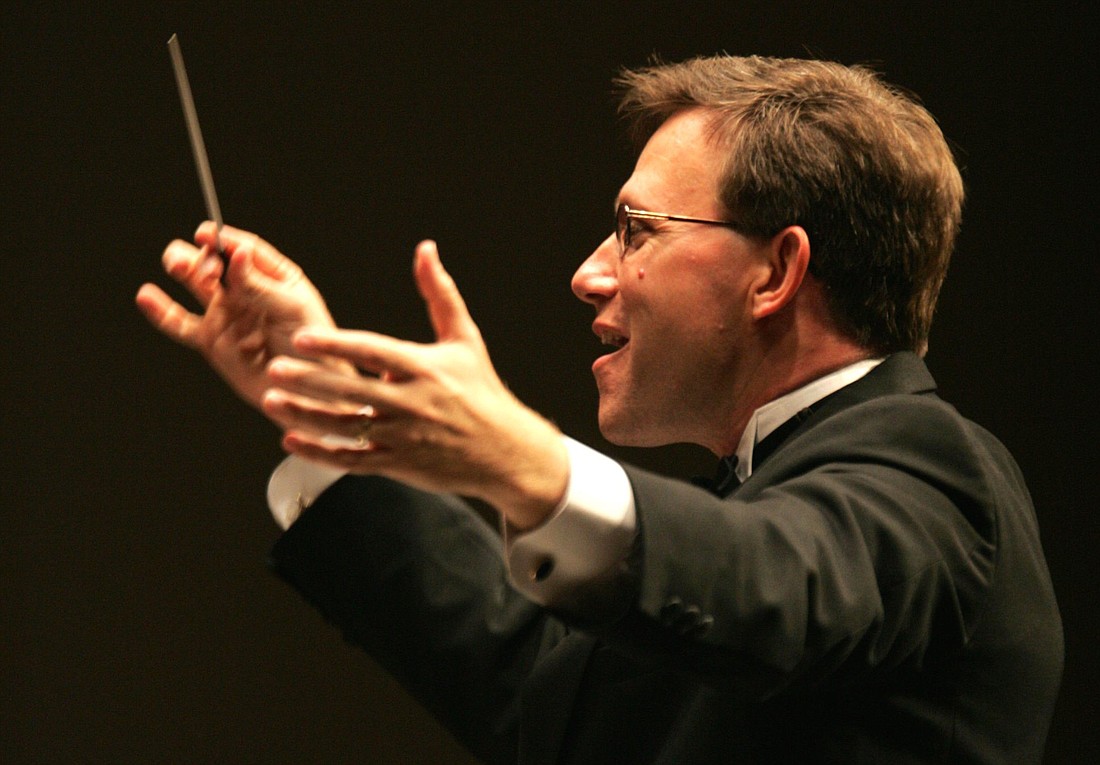- November 26, 2024
-
-
Loading

Loading

As Cole Porter wrote in “Anything Goes,” “Times have changed and we’ve often rewound the clock … ” The clock was rewound Saturday night at the Opera House, when the Sarasota Orchestra celebrated its 65th anniversary with a recreation of its very first concert. The program, originally created by Dr. Lyman Wiltse in 1949 with the (then) Florida West Coast Symphony, was certainly different from the types of concerts we hear these days and, in a way, it was an anything goes sort of program; a musical hodge-podge of short pieces starting with an overture, going on to a well-known symphony and then making its way through short show-stoppers and blockbusters that would please everyone from the serious concert-goer to the “bobbysoxers” in the audience.
Whether Wiltse chose the music 65 years ago because he thought it made a good program or because the pieces fit the musicians (and scores) he had on hand really doesn’t matter. The important thing to remember is, through his effort, music was born in Sarasota, and we’ve seen a grand evolution of an orchestra that’s grown in size, stature and sound.
Guest conductor Christopher Confessore, who led Saturday evening’s performance, told us he’d heard his first symphony orchestra concert in the mid-1970s, when he attended a program by the Florida West Coast Symphony and now, here he is, not only conducting ensembles around the world but also standing on the podium in front of this very same orchestra.
There were other nostalgic stories told, thanks to various videos shown between the pieces of music. Dan Jordan, the orchestra’s concertmaster since the late 1990s, shared the incredible story of his violin, an instrument more than 300 years old that he spotted in a shop in Boston before he moved to Sarasota. He fell in love with the instrument but couldn’t afford it. But fate stepped in. He won the position as concertmaster in Sarasota and the violin, which had been in the hands of Florida West Coast Symphony concertmasters before him, made its way back to Sarasota and into his hands, thanks to the generosity of Ernest and Alisa Kretzmer, who purchased the violin for Jordan and future concertmasters.
Verbal nostalgia is moving, but it was the music that really set the tone for this special celebration. Confessore conducted a sprightly reading of Nicolai’s overture to “The Merry Wives of Windsor” to get things going, followed by Schubert’s “Unfinished” Symphony, in B minor, which was the longest work on the program.
Saint-Saens’ whirling Bacchanale from “Samson and Delilah” was followed by the well-known Hungarian March from Berlioz’s “Damnation of Faust.” And then came a nostalgic performance of part of the “Two Elegiac Melodies” by Grieg, the rollicking “Perpetual Motion” by Johann Strauss Jr., a dated but charming arrangement of Porter’s “In the Still of the Night” and, finally, an energetic reading of the Russian Sailor’s Dance from “The Red Poppy” by Gliere.
See what I mean about a hodge-podge? Times were different when they programmed that way. Of course, there were also no cell phones to interrupt the music (as there were Saturday night) and there was no air-conditioning to cool the audience and keep the instruments in tune.
There was also probably no clue about the future of this ensemble that grew from a few music-loving instrumentalists to a fully professional orchestra that can stand among the finest in the country. As Confessore said at the conclusion of the planned program, “Back 65 years ago, they did encores.” And so, we heard two more pieces. At the request of Sarasota Orchestra’s new music director, Anu Tali — who spoke to the audience via video — the ensemble played an excerpt from the slow movement of Dvorak’s symphony, “From the New World.” It was the portion that contains the reflective folk song, “Going Home,” evoking a sense of the new Estonian conductor’s feelings about coming to this new world.
But, rather than ending on that wistful note, the orchestra geared up for a stirring delivery of the finale from Stravinsky’s “Firebird,” proving that our orchestra is, indeed, at home with various styles and has an even brighter future ahead.